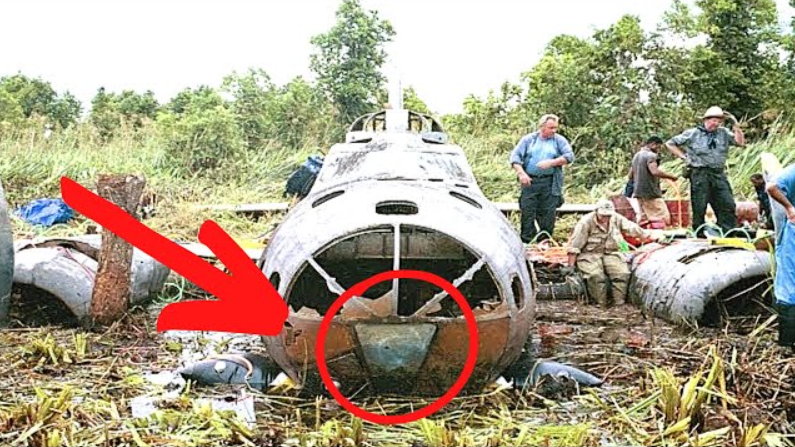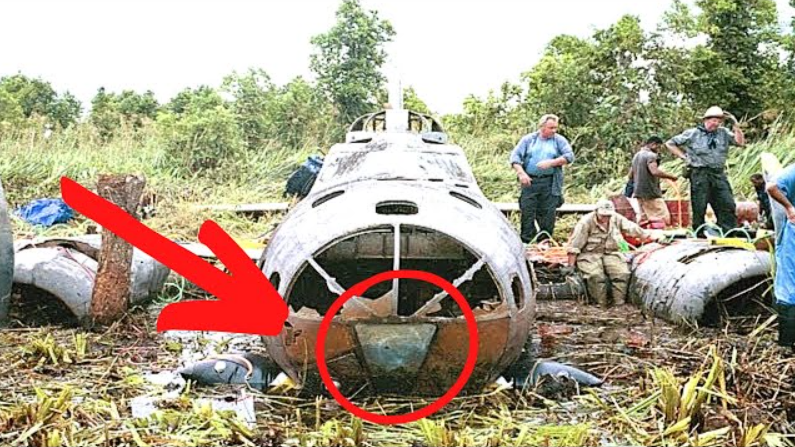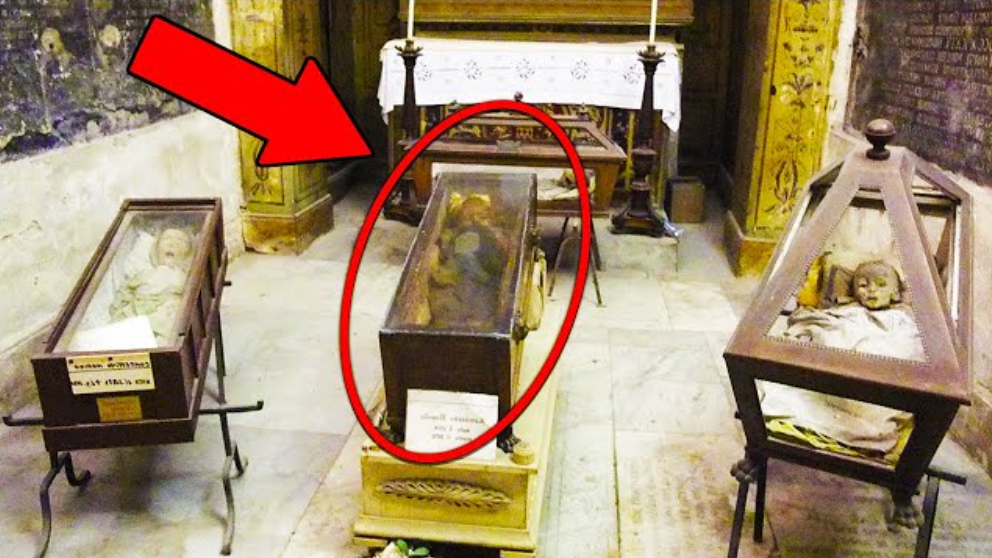They Found a Plane Concealed in the Jungle For Years, But Left Surprised When They Check Inside

They found this Pearl Harbor plane hidden in the jungle, then they looked inside. It’s just amazing what you can see from the clouds; actually, you can see whole cities, great nature, and moreover, you can see strange things that you couldn’t see otherwise.
From time to time, you get to see much more than you hope for when you’re flying. Sometimes you get to see a glimpse of hidden, and no one knows this better than the crew of the Royal Australian Air Force.

The year 1972 was a big one for the Royal Australian Air Force. That’s the year when the whole world heard about them and their swamp discovery. Every flight seemed identical until one day this crew noticed something unusual. This is how their first step towards Swamp Ghost was made.
The Royal Australian Air Force had a whole day planned. They had to do a routine flight across a remote part of Papua New Guinea. At the time, Papua New Guinea was a part of the Australian Commonwealth.
That day started like any other, and it seemed that everything goes as planned. Although it seemed like that, something happened that changed everything. One view can change so much, especially when you’re above the swamps. That’s how this routine day for the Air Force became historically significant.
When the crew first saw it in the swamp, they weren’t sure what they were looking at. At first glance, it looked like any other forested area of Papua New Guinea.
Then, after green scenery, they saw something that wasn’t either green or natural. After miles of green bushes, they saw something strange, but they had no idea what it was. However, it looked like something white and strangely shaped.
Although it was dangerous to go through the swamp and dive in to learn more about the object, the two men decided that they’d have to discover what was hidden in the swamp. David Taylor, a jet enthusiast, and Fred Hagen insisted on the expedition because they knew that the object was something valuable and historically important.
Not everyone knew what they knew about the area. Little was known, but Papua New Guinea was actually a hot spot during World War Two and played a battle for the southwest Pacific. David and Fred knew that there were treasures just waiting to be discovered.
Once World War Two ended, visitors came to the island in the hope to find the war wreckage. In no time, war tourism became a thing. Moreover, people started exploring Papua New Guinea.
Tourists loved exploring war bases that were left by Japanese, American, and Australian armies. So, once the Australian Air Force spotted something, David and Fred were ready to dive in and learn what the object was, and no one could stop them.
Fred and David were professionals with old war relics and restoring them into new and even better condition. So, they made a team, had the right equipment on, and started their expedition. In no time, the mission was on, and they headed out to discover what the monster in the swamp actually was. But they knew one thing for sure, whatever it was, it was there for decades, no doubt.
This wasn’t an easy mission, after all, they had to go through the wilderness of Papua New Guinea and step into a crocodile-infested swamp, and this team loved every step. Surprisingly, the hard-to-reach location and the fact that the object was partially submerged in water were factors that contributed to the preservation of the object. No one could believe how well the object was preserved.
Once the expedition reached its destination, it became instantly clear what the object was. However, no one could believe that it was still in such good shape. The entire team and the world soon enough discovered that the local swamp ghost was actually a very large plane. But how long had it been there, and from where did it appear?
Media went crazy when they learned about the discovery. Actually, media coverage was so enormous that people immediately went to see the plane in its glory. But they still wanted to know how it got there.
Once the plane was inspected, it was discovered that it was a plane from the World War Two era, and it was a bomber plane. This plane became known as the holy grail of military aviation. It was so well preserved which made moving it from the swamp more challenging.
The bomber served as a reminder of the previous time and a long-lasting proof of a major conflict zone and the Japanese Empire during the war. However, it had to be moved from the swamp. The plane was in the swamp; therefore, it was already impossible to get to. So, moving it would be a mission impossible without making enormous damage. But Dave and Fred knew they’d have to find a way. After all, they were professionals.
It was determined that Swamp Ghost was actually a B-17 Flying Fortress plane type. Silbey said it was a really big plane.
So, David and Fred started their endeavor in the 1980s, but it took them decades to restore the plane to its original appearance. The plane got a nickname, the Flying Fortress, thanks to a Seattle Times journalist from 1935. During the test flight, the journalist told everyone that it reminded him of a Flying Fortress. So, the name lived.
Just one day before the notorious Japanese attack on Pearl Harbor on December 7th, 1941, the Swamp Ghost was on a special mission. Yes, the plane was located in Papua New Guinea. The Japanese invaded the township of Rabaul on the island of Papua New Guinea, meaning that was an end for the Flying Fortress.
That day, nothing went as planned. During the attack, the Swamp Ghost was hit, but the plane didn’t explode. So, the crew tried to make its way back to Port Moresby, New Guinea’s capital city. However, the plane never reached its destination.
The crew had two major problems, a punctured wing and the massive leaking of fuel. So, the pilot had to make a crash landing. What he believed to be a perfect place to make a crash landing was actually a real tragedy.
During the flight, the pilot spotted what he believed to be a soft wheat field. However, it only appeared to be; the truth was so far from that. So, what the pilot believed to be a wheat field ended up being a swamp with deadly crocodiles. Strangely, crew members were not seriously injured, and the landing was successful.
Although the entire crew survived, each member caught malaria while they were trying to safely leave the swamp. They met natives, were taken back to their village, and nursed back down. The crew reunited with the US forces once they got better in the city of Moresby. They were welcomed and celebrated as heroes. Interestingly, they were immediately sent on a new mission.
Although the crew members were safe and sent on a new mission, no one cared at the time about the lost plane. Even at that moment, it was clear that Guinea would be the graveyard for numerous planes.
From that moment on, the plane was known only to locals. Locals adored the plane and called it the Swamp Ghost. It was forgotten by the US forces completely. In addition, there were no efforts to recover the plane until 1972 when the world learned about this plane.
In 1972, everyone was shocked. The shock was even bigger when Fred and David informed the media how well preserved the plane actually was. Experts believe that the preservation was possible because the plane was partially submerged in water and it was difficult to approach it. However, that didn’t stop locals from turning the plane inside out. The plane was better preserved outside than inside.
Once they stepped inside the plane, they saw that all the weaponry and mechanics had been taken out. Fred and David were determined to restore this Flying Fortress, so they decided to ignore the missing parts and continue with the mission. After all, the Flying Fortress was one of the four other planes of its kind in the world.
The plane was forgotten by everyone for almost seven decades. Moreover, the Flying Fortress was located in the Agaiambo swamp for 64 years exactly. David and Fred knew that there was much more history here, and the Pacific Aviation Museum in Hawaii explained it. At the time of the discovery, the Flying Fortress was the only unretired World War Two era B-17 bomber. In addition, the bomber was all intact and with real battle scars.
But there was more. Since its introduction to the world in 1938, the B-17 was the third most massively made bomber ever. It was mostly used against German forces in Europe. Since the B-17 was so massive and strong, the plane was used not only against Germans but against the Japanese as well. At the time, the B-17 was directly responsible for dropping 640 thousand tons of bombs.
But why was this important to Fred and David? President Roosevelt had a vision of the modern US military, so the B-17 was a huge part of that dream. The B-17 was a new generation of a bomber, capable of carrying more. But the B-17 was so much more than that. Once World War Two was over, the majority of the bombers were sent home to the states, while only a few remained in use, mostly for air-sea rescue.
Locals treated the bomber as a real holy relic; they adored it for decades. So, it wasn’t easy to let go of it. This was something that Fred and David didn’t plan. So, David and Fred had to talk with the villagers and convince them to hand over the bomber. Eventually, they agreed to give the bomber away under one condition.
After long talks and many days, the villagers said yes to moving the bomber from the swamp. However, locals wanted to perform a ceremony since the plane spent decades on what they considered holy ground.
After that ceremony, the plane was ready to be moved. Eventually, the bomber was lifted by a Russian-made military helicopter. Everyone just watched as the bomber was going offshore.
The Flying Fortress was moved from Papua New Guinea to Long Beach, California. Who saw the plane first? Relatives of the original crew. From that day on, the bomber has been on display at the Pacific Aviation Museum at Pearl Harbor.
The B-17 stands as a memorial for a horrific war that took millions of lives. Once the plane was safely returned and based in the States, the restoration could begin. That was no easy task; the investment was huge.
The restoration of the plane exceeded five million dollars. But for restoring a relic of this sort, five million dollars was actually a modest sum. Even today, many of the locals are upset that the plane was moved.
The plane attracted a huge number of tourists, and by removing the plane, their economy was heavily affected.




